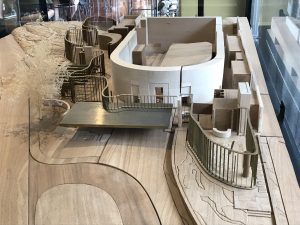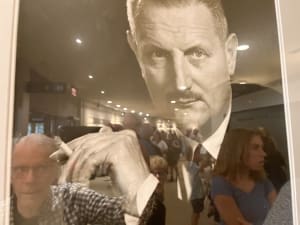Ransacking Troy: August 8, 2025 panel outlines seven years of ensemble work leading up to world premiere at Stratford Festival
On Friday, Aug. 8, 2025, I attended a panel discussion at the Tom Patterson Theatre in Stratford, Ontario. This informative event, which outlined development of Ransacking Troy over a period of seven years, leading up to its premiere at the Stratford Festival in August 2025, was entitled “All Together Now: Ensemble Work from Ancient Greece to the Present.”

Lazaridis Hall, Tom Patterson Theatre. In the background is the William Allman Memorial Hall on Morenz Drive facing the theatre property. Jaan Pill photo
The event featured immersion for ninety minutes, in a highly engaging comparing of notes – in this case about ensemble work in the theatre.
Oxford Languages defines the term ensemble as follows:
1. a group of musicians, actors, or dancers who perform together.
“a Bulgarian folk ensemble”
Similar words include, among others, group, company, troupe, circle, association.
2. a group of items viewed as a whole rather than individually.
“the buildings in the square present a charming provincial ensemble”
What follows is an account of this Meighen Forum panel based on my handwritten notes. I wrote the notes in italic script, which enables a person to write quickly while still maintaining legibility.
Italic script features quick strokes of a pen or pencil to form letters; this accounts for the fact legibility is maintained even when you write very quickly. Cursive writing, in contrast, features a procedure where the pen or pencil stays in constant contact with the writing surface: a very inefficient form of writing, which nonetheless was the standard method taught in the past, and which may be taught even now in elementary schools.

View from entrance to Tom Patterson Theatre; in background is the Avon River. Jaan Pill photo
Any reporter’s account is a given person’s representation – which may inevitably introduce distortions – of a given meeting. Yet such accounts can be of value even if they provide but a gist of who said what. Where I quote people in the text that follows, sometimes the quotes may be paraphrases of words actually spoken. We do not have a recording of the panel. Any comments or corrections from site visitors are always welcome.
Three panelists and a moderator
The Aug. 8, 2025 panel featured Jackie Maxwell, director of Ransacking Troy; Pam Patel, director of MT Space (Multicultural Theatre Space); and Kathryn Mattison, associate professor in Greek and Roman studies, McMaster University. Bob White, dramaturge of Ransacking Troy, was moderator.
I was interested to encounter the term dramaturge, which Oxford Languages defines as a literary editor on staff of a theatre who consults with authors and edits texts. Another definition, at Vocabulary.com, says a dramaturge helps a director interpret the text of a play.
The panel began with a Land Acknowledgement which referred to the Huron Tract, and the dispossession of Indigenous Nations of their land.
Before the event began, index cards and pencils were passed around; attendees could write questions for panelists to answer at the end of the panel. My own question sought comment regarding the fact that civic life in ancient Greece was made possible by the institution of slavery.
The term ensemble
The term has many meanings; theatrical ensembles can serve a range of purposes. Pam Patel spoke of efforts such as in her own work in theatre, to ensure that previously marginalized voices reach an audience. Jackie Maxwell spoke of the role of ensemble work in development of Ransacking Troy.
Theatre in ancient Greece was engaged in ensemble work through choruses first in rehearsal, then in performance. In describing the origins of Greek tragedy, Kathryn Mattison spoke of the legend of a performer in a Greek chorus who stepped out of a chorus, and then turned around and addressed the chorus. Legend has it this performer was the first actor.
Citizens of ancient Athens would have known of choruses as these were a feature of everyday civic life. Along with citizens, it may be noted, the population also included plenty of non-citizens and slaves. The chorus, which helped the audience follow along as a Greek tragedy unfolded, was always represented by marginalized members of the population – including slaves and young women – who had no access to the upper echelons of society.
To enable their involvement in a play, citizens were paid to join a chorus. This ensured they could devote time to theatrical training. In that way, everyday responsibilities such as cultivation of land, would not be interrupted. Textual evidence indicates that over a period of seventy years, the chorus diminished in importance.
MT Space (Multicultural Theatre Space)
Pam Patel spoke of the ensemble work of MT Space (Multicultural Theatre Space), whose roots are in Tunisia. Actors from the Middle East, Africa, and Europe work together to create a “physical vocabulary, a collaborative creation” assisted by a director to shape the work.
This involves a “paid to train” model focusing on many aspects of theatre including dance, mime, clowning, and music. In such a form of theatrical training, an actor brings a racialized body – and the actor’s own language – to the forefront. A central theme is developed. The thought is, “Say it however you want.” In one work that Patel described, the explosion of a bomb is depicted in theatrical terms.
The two years of training starts with a workshop production. Such a process stands in contrast to starting with a script. The rehearsals don’t start with “here’s the script, here’s the blocking.” This is not a scenario where a director steps forward and runs the show start to finish.

Architectural model of Tom Patterson Theatre, on display at Festival Theatre, May 7, 2019. Source: Hariri Pontarini Architects. Jaan Pill photo
Audience feedback is important during the collaborative process that Patel describes. People with lived experience of a particular matter at hand, which is addressed in development of a given theatrical production, are brought in to share feedback following workshop performances.
The work that is created is very political; it reaches refugee and immigrant audiences. Actors involved in the work have in the past been struggling to continue their craft; now they have a setting where they can honour the cultural practice learned prior to immigration. There hasn’t previously been an institution that enables such training. MT Space has taken on such a role.
Rehearsals can involve major changes
Bob White, the moderator, spoke of the challenge of negotiating different points of view. Jackie Maxwell, director of Ransacking Troy, said that in developing the roles of nine women and their supporters, a smaller ensemble emerges from within the larger Stratford Festival ensemble. The former ensemble is engaged with movement skills, vocal skills, and storytelling connected to the performance of a chorus. An actor might be called upon to switch their role, in an instance, as in the middle of an impassioned speech.
Ransacking Troy was developed in the course of seven years of workshop performances. Workshopped extensively in Toronto, the project became well known in the theatre community. Many theatrical skills were disseminated. Maev Beaty was involved almost from the beginning. Maxwell spoke of the necessity to be fluid – to have the capability to move and speak with passion, individually and within the group.

Lazaridis Hall – in middle of figure – serves as venue for Meighen Forum events. Detail from architectural plan on display at Festival Theatre, Sept. 7, 2019. Source: Hariri Pontarini Architects. Jaan Pill photo
Jackie Maxwell spoke of Erin Shields as an “amazing rewriter.” “She needs a dramaturge; that’s why we need a Bob.” Bob White in turn said a rehearsal can give rise to changes. Sometimes, that can be frustrating; it can be irritating.
Maxwell spoke of the Ransacking Troy cast as a very variegated chorus. Choral movement requires the work of a choreographer; while the ability to turn into different people requires the embodiment of many theatrical skills.
The work calls for “no preciousness: you lose your darlings – here’s a new thing for you to say.” You get to achieve a balance: it could be a movement focus, at a particular point; or it could be a “saying-words focus.” “We have,” said Maxwell, “created a mini-ensemble.”
Playwright as director in ancient Athens
Bob White spoke of the requirement of patience, in rehearsal: the director is patient: juggling various needs. For Pam Patel, comments from the panel totally resonated with her own experience. A text developer is involved with ensemble work, as is a designer. The ongoing theatrical development is also open to the public. “Patience is key,” she remarked. She spoke of a narrative related to events of some years ago in Jordan. Three hotels were attacked by suicide bombers. A film director was at a hotel to meet his daughter. Both were killed. The director had worked on a Halloween Slasher series.
The director-founder of MT Space had said, “Let’s sit down and circle up.” Patel referred to a discussion with regard to whether a particular stage of ensemble work would, or would not, resonate with the metaphor of a sinking ship. (The upshot was that the ship stayed afloat, after all.) The group, started in 2009, is still touring. Patel can step out and see the scene from the vantage point of a director. She referred to “the fine line between the play and the life.” The fine line is always there.

Architectural model of Tom Patterson Theatre, on display at Festival Theatre, Sept. 22, 2019. Source: Hariri Pontarini Architects. Jaan Pill photo
Kathryn Mattison spoke about ancient Athens; the playwright in that era was the director. We don’t know how fully things were written in the script before rehearsal started. The playwright might wait to see the talent level of the players. Was it a matter of rewriting or creating the text then and there? We don’t know. The plays are called a trilogy, but four plays were actually staged. Different aspects of theatre were involved. Some plays were very physical. Playwright and ensemble worked together. The text that emerged represented the final product.
Man in the room
Bob White said that fifty years ago, we had the image of “the man in the room who ran the show.” Now, that is deconstructed. Even in legacy institutions such as the Stratford Festival, White noted, it takes time to change what’s at play. The role that Tyrone Guthrie, first artistic director of the Stratford Festival, played years ago belongs to a previous era. A different process of creation is now in play. We’re no longer dealing with “the old-time meat puppets.” The previous scenario is compared to the current state of affairs, where a director might say, ‘I don’t know; let’s give it a try.”
Jackie Maxwell spoke of a huge shift; the playwright Erin Shields has played into that. As well, the actor Sarah Dodds has been positioned at times “outside of her skill set.” Maxwell noted, “they are called plays; so there has to be a freedom” associated with the notion of play. This means you may “make egregious mistakes” – leading to discoveries. For the new piece the thought kept in mind has been: “keep it open.”
Pam Patel spoke of a director who says “look at children” at play. There’s an element of danger in children’s play: you don’t know what will happen next. Children’s play is also serious: all at once, a whole stack of blocks may fall.
Maxwell spoke of the requirement of a level of trust. This entails knowing each other; for that, you need enough rehearsal time. “You need time and trust in order to take risks together.” This is more likely to arise in ensemble situations, in comparison to bringing people together who have not had the experience of previously working together.
Bob White said we are dealing with a kind of “chosen family.” There might be some person you worked with twenty years ago; when you work with that person again,“you just pick up from there.” The ensemble become a kind of home: this is one of the things the ensemble concept leads to.
Concept of home in Greek tragedy
Kathryn Mattison spoke of the concept of home in Greek tragedy. She thought of this during the Covid pandemic. So many Greek plays are concerned with losing home; or being mistaken about what home entails. The importance of the chorus is connected with how people are responding to these notions: the experience of being exiled from home; of seeking to return.
The chorus is engaged in looking at these issues: of not losing home; of not being isolated. This is a theme not previously, before Covid, at the forefront for Mattison, who, during the pandemic wanted to get away from the security of the house she was in; wanted to get away. The Greek chorus, Mattison added, is tuned in to isolation. It involves being part of the community even in the context of a life at the margins.

Aug. 14, 2021. Tent near Morenz Drive and Lakeside Drive at Tom Patterson Theatre parking lot during COVID pandemic. Jaan Pill photo
Jackie Maxwell spoke as well of the concept of home: The Odyssey is about “leaving home to find home.” When she was at the Shaw Festival, she had a local home. People came to visit. Another feature of theatrical life is that theatre as a community is full of people who are not at home. Then in the course of their work the rehearsal is the home.

Aug. 16, 2025. Parking lot near Morenz Drive and Lakeside Drive at Tom Patterson Theatre. Jaan Pill photo
Pam Patel noted, “I just came here from Turkey.” She ended up being “part of the show.” Patel also referred to the Impact 25 International Theatre Festival in Downtown Kitchener, Waterloo Region, September 23rd-28th, 2025. Bob White spoke of a world where thanks to the internet we’ve become siloed; we consequently are in settings that reflect our own biases. One can see a society with a blinkered way of creating one or another world. One seeks to create a space: when at home, a person needs to debate: a person needs dialogue and discourse. Theatre “can provide a way for people to come together.” He added that people may fail to come together but they try.
Questions
Kathryn Mattison spoke of the importance of dissent. That is what is emphasized in studies by scholars who look at the intellectual history of many realms: dissent is essential in a democracy. When dissent is out of the picture, we have an autocratic state of affairs. Tragedy is about how to have dissent when it’s not allowed. In tragedy, the monarchy falls; we have a modelling, Mattison said, of the value of dissent. Bob White commented: “That’s how ensembles work; it’s built into the structure.”
As the panel drew to a close, Bob White chose questions from the audience, written on index cards.
One question was about the fact that in previous eras, blasphemy, as in the form of impious behaviour, was viewed as a serious crime. Jackie Maxwell spoke to how this was addressed: “this entails the ‘god conversation.’ ” The playwright Erin Shields would take this on during rehearsals for Ransacking Troy.
The “god conversation” may be put aside during a performance when something more interesting appears on the scene. For example, a mist might appear on the stage, attributed to the gods. The actors generally don’t play the role of gods: “It’s hard to get away from very obvious manifestations” of godliness, when actors are called upon to play the part of gods.
How many meanings will an actor simultaneously convey?
There was a question about how many layers of meaning an actor will simultaneously convey at a given time. The answer was that sometimes an actor just acts out whatever there is to convey. Or, alternatively, there’s just a reference – with no acting out – to some matter related to the unfolding of the play: the matter in question will not be acted out.
Another question: What to make of the fact that civic life in ancient Greece was made possible – was founded upon – the institution of slavery? Kathryn Mattison responded that slavery was a huge part of all ancient societies. Ancient slavery was different from the slavery in the United States during a more recent historical era.
Slaves in ancient societies were people captured during war: women and children were enslaved; with some exceptions, men captured in war were killed. A case where men were enslaved concerned the failed Athenian attempt to take Syracuse. Survivors were kept as slaves but there was not a huge market for slaves, at the time; thus, the survivors were kept in a stone quarry just outside Syracuse. The story goes that some of the slaves gained freedom by performing in choruses.
People would be born into slavery as well, Mattison noted. Citizens in Athens had democracy – but only some citizens; women were not citizens. Until ten or twenty years ago, Greece and Rome have been idolized by Western scholars for their zeal for democracy but that has changed. Now there is a focus on seeking to locate non-citizens in the recorded history of ancient Greece and Rome.
Bob White spoke of the glorification of gladiator warfare. He spoke of this as bad stuff. The gladiators were not free.
How to reach a wider audience given financial constraints
A question for Pam Patel: How to reach a wider audience given financial constraints. Answer was that the wife of the director who started MT Space was in a PhD program at the University of Waterloo. That’s how the couple came to Canada. MT Space has now been around for twenty years.
Along with other organizations it is now establishing its presence – for example, it has been invited to speak with government officials. Patel referred to the Impact 25 International Theatre Festival in September 2025. She spoke of a means of exchange at the local, national, and international levels regarding “how to shift the power.” She sees all this work as a means to an end. When such an initiative is no longer needed, then “we’ve reached our vision.” She spoke of the goal of “a community where all belong.”
Revisions
A question followed for Jackie Maxwell concerning revisions. Erin Shields has spoken of “just a few things to think about.” Maxwell referred to the current rehearsals (at the time of the Aug. 8, 2025 panel) and to eight previews.

From an earlier post: original model of the Festival thrust stage, a new variant on a centuries-old idea, designed by Tanya Moiseiwitsch in consultation with Tyrone Guthrie, 1953. Though Moiseiwitsch’s stage has been modified a few times since its original incarnation, its basic architecture remains the same today. Photo courtesy of Stratford Festival Archives
An assistant at a preview might be asked to sit in a corner at a preview: “Tell me what you can’t see.” You want each person in the audience to get clarity; the view is from three-quarters around the stage; it’s not theatre in the round that you are seeing.
During a previous preview, a question that arose was, “Are we going toward completion, for the production?” With regard to fine-tuning, “How long to keep the doors open to further changes before completion?”
In response to the question, the entire process was described as a delightfully long journey. Bob White said the encounter with the audience is the most important litmus test for the play. It’s live theatre, with many audiences to keep in mind. The matinee audience, for instance, is different from some other audiences. Now being over the hump of the journey the refinement can proceed.
Jackie Maxwell spoke of “the incredible creative team” of designers such as lighting designers, sound designers, and set and costume designers.
Reading and writing in Greek
In response to a question about language, Kathryn Mattison said you have to know the language of ancient Greece including the metaphors. Among academics specializing in this stage of history, how a word, such as a compound word, is translated can give rise to extensive debate and controversy.
Jackie Maxwell noted that “what you’re hearing is all about passion.” You have to have these arguments, on all topics.
Another question: Is the ensemble element viable in Sense and Sensibility; and in Anne of Green Gables? The answer: Yes, you see the ensemble element here also. There was a reference to the waning of naturalism: realism is being explored. We’re a step beyond a play depicting people drinking scotch and yelling at each other.
Biographies of panelists connected with Ransacking Troy; and description of MT Space
Source for three of the panelists connected with Ransacking Troy is from the online program for the panel; the information about MT Space is from the MT Space website.
Kathryn Mattison
Kathryn Mattison is an Associate Professor in the Greek and Roman Studies department at McMaster University, whose research focuses on different aspects of Greek tragedy and how it interacts with the society that produced it. She has published articles on Euripides’ Hecuba, Sophocles’ Trachiniae, pseudo-Euripides’ Rhesus, and on the connections between tragedy and archaic lyric poetry. Her current research focuses on different representations of home in tragedy, which can help us to think about the ancient Athenian audience’s community values and can also provide a framework for thinking about our own society.
Jackie Maxwell
2025: Director of Ransacking Troy. Third season. Jackie is a celebrated Canadian director, artistic director, dramaturge and teacher. She has directed for theatres across the country including the Stratford Festival (Paradise Lost, The Changeling), Tarragon, Citadel, Soulpepper, Canadian Stage, Mirvish, Theatre Calgary, Coalmine and Centaur, Montreal, as well as several theatres in the United States. Jackie served as Artistic Director of the Shaw Festival for 14 seasons, 2002-2016. She directed over 25 productions there. She also created a new performance space to include and promote provocative contemporary plays in Shaw’s programming. It has since been named the Jackie Maxwell Studio Theatre. Jackie was AD at Factory Theatre from 1987-1995. She has been awarded the Order of Canada, the Order of Ontario, two Honorary Doctorates and has received two Dora Mavor Moore awards for Direction.
Bob White
(he/him)
2025: Dramaturge of Ransacking Troy. 17th season. Stratford: Former Director of the Foerster Bernstein New Play Development Program (2012-2022). Dramaturgy credits include Salesman in China, Casey and Diana, Every Little Nookie, Hamlet-911, Little Women, Kate Hennig’s Queenmaker Trilogy, Paradise Lost, The Breathing Hole, Bunny and many others. Elsewhere: Artistic Director, Alberta Theatre Projects, Calgary (1999-2009); Co-Director, Banff Playwrights Lab (1997-2009); Artistic Director, Factory Theatre, Toronto (1979-1987). Director of over 75 productions from Cow Head, Newfoundland to Victoria, British Columbia and places in between, but mostly in Calgary and Toronto. Training: Loyola College, Montreal, and University of Alberta. Awards: Honorary Doctor of Laws (LLD), University of Calgary. In 2018, Bob was awarded the GE Lessing Award for Career Achievement by the Literary Managers and Dramaturgs of the Americas. Bob is a member of the Order of Canada.
About MT Space
MT Space brings different communities together to create a community of difference.
MT Space was created to centralize marginalized and racialized artists and stories, to fill what seems to be a great void in a community of many different peoples.
MT Space (Multicultural Theatre Space) was founded in 2004 by Lebanese-Canadian Majdi Bou-Matar, who was a trained director, actor, and dancer. Majdi relocated to Canada when his wife was accepted to University of Waterloo to pursue a PhD. Thinking that Majdi would continue his career in Canada as a multi-talented artist, he auditioned with various theatre companies in Southern Ontario. After receiving the same criticism over and over, hearing that his accent was too thick or that he “didn’t look the part”, Majdi decided to create a company that would become a platform for all artists that felt marginalized, racialized, and displaced. This is how MT Space was born.
For the past seventeen years, MT Space has been fulfilling its mandate by creating, producing, touring, and presenting artistic work that reflects Canada’s cultural diversity. Since 2004, MT Space has become a conduit for internationally trained immigrants and newcomer professionals across all disciplines. In July 2016, Pam Patel – who had been an artistic associate with MT Space since 2008 and mentored with Majdi – stepped into the role of Artistic Director and looks forward to ushering the organization into its next decade of powerful artistic work, bringing with her a South Asian background and Canadian upbringing.
MT Space has grown from being a company that produces one show every year to an organization that brings culturally and socially relevant work from across the country and around the world to our community of Kitchener-Waterloo. We have challenged the preconceptions of theatre to create, produce, and present work that is accessible and affordable to low-income families while creating a space for Indigenous, immigrant, refugee, and marginalized voices to be heard.
MT Space challenges the definition of theatre to include all disciplines such as dance, music, multimedia, and circus performing arts. As such, MT Space is becoming a presenter of artists and arts organizations across many disciplines.
[End of report on Aug. 8, 2025 Ransacking Troy panel]
My comments regarding Tyrone Guthrie’s style of directing
I was interested in the characterization, in the panel, of Tyrone Guthrie as exemplifying the ‘man in the room’ style of directing. I think it may be helpful to add some nuance to the characterization.
From what I can gather (and I claim no expertise about such matters), Guthrie appeared, indeed, to adopt an in-your-face style of directing, during an era where the director was, as I understand, expected to run the show, period.
In particular, by way of adding some nuance to characterization of his persona, we may note that as a young person, Guthrie turned down the opportunity to serve as an officer at some higher echelon in the British empire. Clearly, such a path was not for him.
Some of his contemporaries at Oxford University, similar to Guthrie in class background and social status, embarked upon careers where they would serve as military leaders or government officials in one corner or another of the British empire.
As he underlines in A Life in Theatre (1959), Guthrie was going to have none of that. He chose an alternate route involving the power of imagination. He chose another way to reach the human potential inherent in his circumstances. A quote from A Life in Theatre (pp. 10-11) spells it out:
Outwardly I conformed, but gradually my energies were withdrawn from the real world and focused themselves upon an imaginary world. This world was only partly of my own imagining; far more it was the creation of the novelists whose books I devoured when I should have been preparing lessons – Dickens, George Eliot and, especially, Thackeray. History, in which I could “live,” into which I could escape from the real world legitimately because it was work, absorbed me more and more.
At eighteen I got a History Scholarship to St. John’s college, Oxford.
It must have seemed to my parents the solution of a problem. A dreamy, overgrown, morbidly timid but “clever” and rather exhibitionist youth, I clearly was no longer fitting into their preconception of an Officer and a Gentleman. I was obviously not the type to become a Merchant Prince. Oxford opened up a new set of possibilities. If he did well, the boy might become a don, even in time a professor; there was the law; there was even the church; worst come to absolute worst, he could always get by as a schoolmaster.
I think that, absolutely without knowing it, I already felt that my career would not be in the ordered ranks of a profession. This was probably the main result of those last seething years at school – a determination to work alone.
I began to feel too, at this time, that I had it in me to do something original; I had no idea what, but something which would express what I really felt and thought, not just conformity with current ideas.
Guthrie’s career options
A further quote from A Life in Theatre (pp. 27-28) explains why Guthrie was not about to become an officer or official serving the British empire:
I suppose my panic was apparent. Peter Cresswell very good-naturedly offered to help me. He took me to his club and we started to telephone from there. After two or three calls we had got the loan of the bar at the New Theatre. I was to be there at nine-thirty to arrange the chairs.
I now had leisure to observe my surroundings; till now I had been too flustered. I had never been in a London club before. This one was very grand. Was it the Cavalry Club? Something military. Peter had been a regular soldier. The walls were covered with field marshals on horseback, field marshals waving swords and flourishing batons. Field marshals against backgrounds of flaming cities or devoted Sepoys.
Peter ordered glasses of sherry. There was a tremendous double staircase. There was a table covered with periodicals, upon which fierce old gentlemen kept pouncing like birds of prey … why, goodness, there was the Belfast Telly … a very, very old man hopped up to two other old men, who were playing cards. He hopped like a bird.
“Aren’t you going to play with me?” They took no notice.
“I wish you’d play with me. Archie and Freddie have gone home. Do play with me.”
And now a man in a tail-coat with brass buttons was bringing two glasses of sherry on a silver tray. He handed the sherry with an absurd air of respect: “Your sherry, sah.” Why did I suddenly think of old John dumping the hot-water cans outside the doors of our cubicles? It was all extremely uncongenial.
I felt ungrateful to Peter Cresswell, who had been so kind. I tried to look nonchalant and sophisticated, to make elegant but manly conversation, not too unworthy of the excellent sherry, the magnificent staircase, the surrounding marshals. In the back of my mind something clicked into place. The subconscious handed me, as it were, a punched card with the answer. This was Wellington all over again, plushy, not spartan; dry sherry, not tepid bath water; but the iron conventionality was the same, the absolute priority given to a kind of dreary negative correctitude, the need for all these men, most of them quite old, to huddle together, to play at being boys again, to relive the anthill life of the dormitory.
I fled. I professed, I hope, something of my true gratitude to my host who had rescued me from panic and despair. But I fled; and, ever since, I have fled when I have felt come over me that claustrophobic sensation of being back at school, a member of the dormitory, forced to conform to rules which I know to be desperately uncongenial, and believe to be pointlessly repressive and false. The hearts of men are not desperately wicked. It is not my duty to lead my men into battle, nor to impose order on benighted [B]lacks. This is the Temple of Rimmon. There will I not bow down. I have enough sense to run out into the rain.
Further reading
Domination and the Arts of Resistance: Hidden Transcripts (1990) by James C. Scott highlights the role that clubs of the kind Guthrie describes have played in history.
Practising diversity at the Stratford Festival of Canada: Performance and ethics in the twenty-first century (2021) by Erin Julian and Kim Solga is well worth a close read.
Of direct relevance to themes addressed at the panel is a book entitled The Missing Thread: A Women’s History of the Ancient World (2024) by Daisy Dunn.
The panel has prompted me to have another look at the authorized biography by James Forsyth entitled Tyrone Guthrie (1976) and has also motivated me to re-read In Various Directions (1965) in which Guthrie – speaking from the vantage point of sixty years ago – holds forth on topics of interest including the theatre of antiquity.
I’ve revisited a previous post about warfare:
I became interested in the latter post when I noticed site visitors have been reading it. The post brings to mind books by Sebastian Junger regarding warfare, evolutionary history, and the concept of freedom.
I have recently been reading with interest Buried Secrets: Truth and Human Rights in Guatemala (2003) by Victoria Sanford. This informative study outlines the role forensic anthropology can play in the study of history. The book describes (p. 239) a therapeutic testimonial model (an alternative to the PTSD model) for dealing with the trauma of the genocide in Guatemala documented by Victoria Sanford and other observers.
The model “challenges the core assumptions of homogenized culture underlying the very concept of universal diagnosis (and its emphasis on individual autonomy) and in particular the relevance of PTSD (which is based on symptoms and treatment of individuals) to cultures in which individual personhood is based more in the identity of community culture than in that of the identity of the individual.”
The focus on “community culture” brings to mind a sense of community self-organizing, which appears to me a central feature of ensemble work, as described in the Aug. 8, 2025 panel at the Tom Patterson Theatre.

Source: Hariri Pontarini Architects CLICK ON IMAGE TO ENLARGE IT
Leave a Reply
Want to join the discussion?Feel free to contribute!





Blessings in Disguise (1985) by Alec Guinness provides some counterpoint to what Tyrone Guthrie has to say about theatre. Guinness offers commentary about Guthrie which adds to our understanding of where both Guthrie and Guinness were coming from.
A discussion regarding diversity, equity, and inclusion at the Stratford Festival can benefit from reference to two additional articles to add to one by Erin Julian and Kim Solga.
The first is The Stratford Festival’s journey to diversity and inclusion (2011) by Hamlin Grange et al. The article outlines what I would describe as a step – on a long road – in the right direction.
A second article is featured at a previous post:
Aug. 26, 2019 Arts Journal article by Diane Ragsdale is entitled “The Changing Face of Arts Engagement: My remarks at the Stratford Festival Forum”
An excerpt reads:
The best definition of cultural equity I have ever heard came from Jamie Bennett, the brilliant executive director of ArtPlace America. He once said to me, “Cultural equity is the right to hear your own stories told and the obligation to hear the stories of others.”
As I note in the main text, an earlier post which also concerns warfare and Ancient Greece is entitled:
Jonathan Shay speaks of moral injury in Achilles in Vietnam: Combat Trauma and the Undoing of Character (1994)